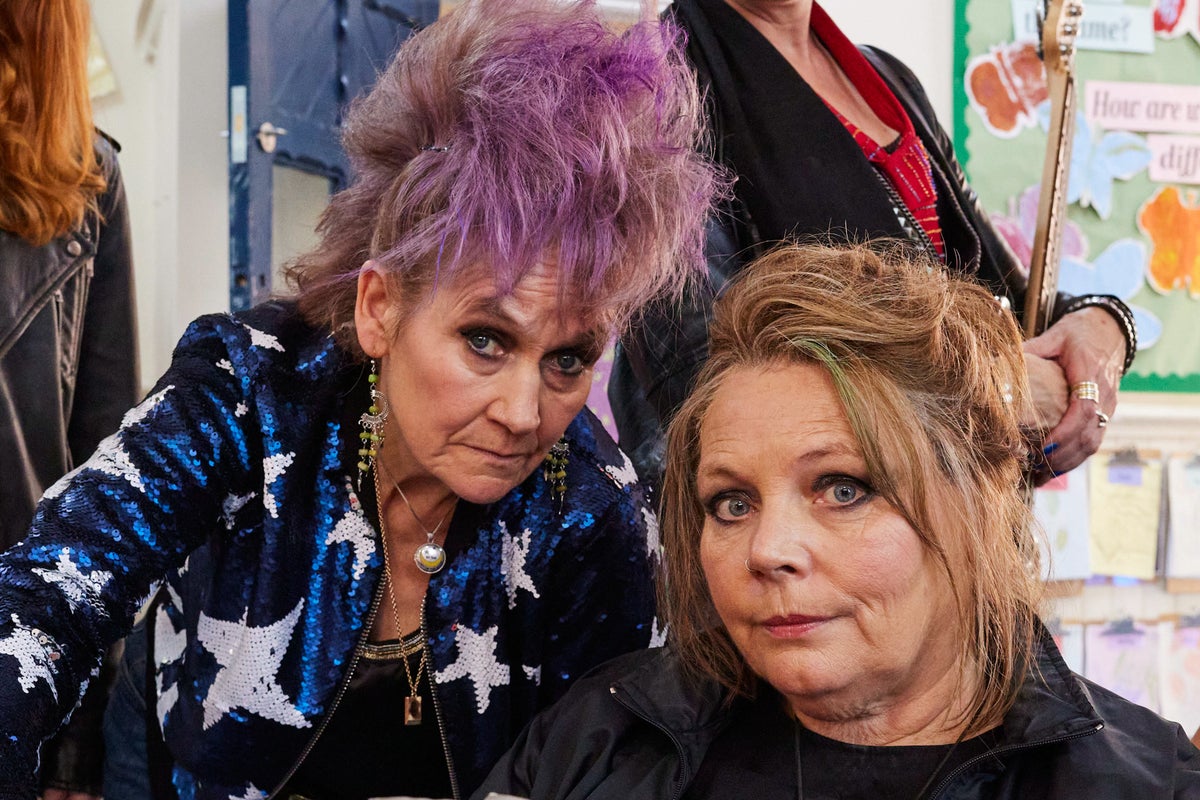In the process of killing herself, Beth (Joanna Scanlan) finds she’s interrupted by a series of urgent phone calls. First, her brother, protesting plans to buy an annuity for their mother, and then, mercifully, her friend Jess (Lorraine Ashbourne) asking whether she wants to join a rock band. “Why?” she asks. “For fun,” Jess replies. And so begins Riot Women, the latest chapter of Sally Wainwright’s televisual diorama of life in the Calder Valley.
Joining depressed teacher Beth and lonely publican Jess on their crusade into a territory usually occupied by “men of a certain age” are a series of local misfits. There’s recently retired copper Holly (Tamsin Greig) and her dour sister Yvonne (Amelia Bullmore), as well as Holly’s young protégé Nisha (Taj Atwal). “We sing songs about being middle-aged and menopausal and more or less invisible,” Beth tells a bemused salesman at the music store. “And you thought The Clash were angry!” But the band is missing one thing: a lead vocalist. That’s where Kitty (Rosalie Craig), a volatile addict who’s recently been arrested by Holly, steps in. She has the pipes, but she needs somewhere to kip – so she ends up bunking with Beth. As the music brings them closer, the two women strike up an unlikely, and deeply connected, friendship.
Riot Women forms the third chapter of a loose trilogy, in which Wainwright has turned Hebden Bridge and its wild environs into a distinctive canvas for British drama. There is a shared DNA here: Last Tango in Halifax and Happy Valley were starkly different in tone, but both took strong female protagonists and showed them reasserting control over a society that, all too often, marginalised them.
And this is the crux of Riot Women. The characters feel forgotten by personal and professional structures that prioritise men and only value women for their youth. “Let’s start a riot,” the theme music roars. “We won’t be quiet!” It makes explicit a manifesto that has always been latent in Wainwright’s work. From Nicola Walker’s resilient widow Gillian in Last Tango to Sarah Lancashire’s redoubtable detective Catherine in Happy Valley, nobody has managed to make middle-aged women more visible than Wainwright.
She’s aided here by a stellar cast, who deliver her signature tripping dialogue with confidence. At the centre of all things is Scanlan’s Beth, a woman who inhabits a duality: she is both extremely resilient and fundamentally fragile. Scanlan has long been a superb supporting presence on British TV, and Riot Women feels like a rare opportunity for her talents to take the lead. Beth is vulnerable and powerful, and Scanlon plays both sides of the character beautifully. It balances with Craig’s more flamboyantly emotional performance. “Of all the gin joints in all the towns in the world,” Beth deadpans to Kitty. “I wonder what made me walk into yours?”
There are notes of narrative convenience about their relationship, but that doesn’t dilute the impact. As for the music, it’s best to go in with a high tolerance for cringe. “Poor little manchild forced to suffer because apparently I’m just like my mother,” Kitty warbles. It might not be Patti Smith, but it’s no worse than the latest Taylor Swift album. Riot Women – as they call the band – celebrate the subversive act of being “a rebellious suburban badass bitch”, which comes across as more than a little twee. But while the show might well be marketed as The Full Monty meets School of Rock, while the drama unfolds – and these women’s lives become more rounded – the music becomes more of a backdrop. A thread to connect these seemingly disparate people.
In its setup, Riot Women feels a bit obvious. These women, abandoned by their husbands (“men are just wired wrong,” Jess observes) and children, reclaiming their voices through music. But Wainwright has always known how to take a simple story – an interfamily saga or a cop drama – and tell it so dynamically, so charismatically, that it is elevated. Like its characters, Riot Women takes its time to come into its own – but, when it does, it is full-throated and glorious.

